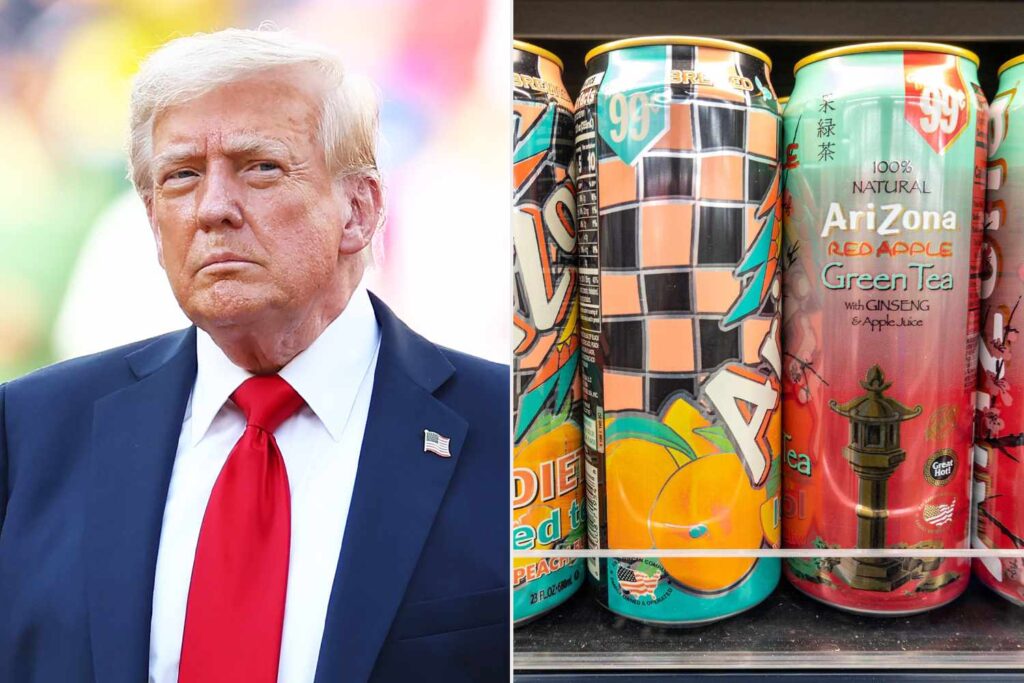NEED TO KNOW
For more than three decades, AriZona has maintained the price of its 22-ounce tallboy iced teas at exactly $0.99 per can.
Now, the company may no longer be able to offer the beverage for less than a dollar, following President Donald Trump’s June 3 announcement to double tariffs on aluminum and steel imports from 25% to 50%. The announcement is a revision to the Section 232 Executive Order signed by Trump in February.
Tolga Akmen/EPA/Bloomberg via Getty
“At some point, the consumer is going to have to pay the price,” AriZona Beverage Company chairman Don Vultaggio told The New York Times on Sunday, Aug. 10. “I hate even the thought of it; it would be a hell of a shame after 30-plus years.”
AriZona Beverages sells approximately 2 billion cans of iced tea, juice cocktails, and various energy drinks per year, according to the outlet. AriZona became the most popular producer and distributor of the Arnold Palmer, a hybrid of iced tea and lemonade.
“We’re holding the line for now despite rising aluminum costs. It’s particularly unfair—80% of our can sheet metal comes from recycled U.S. beverage cans, yet 100% of our aluminum is subject to tariffs,” Vultaggio said in a statement to PEOPLE.
“If pressures keep rising, we may have no choice but to adjust pricing, though we’ll work hard to avoid it,” the statement continued. “Wherever we see savings—like lower crude oil costs for PET—we’re passing them to customers with deeper promotions or outright price cuts, including plastic tall boys at $1.”
The 99-cent drink has endured three U.S. economic recessions since its introduction in 1997, largely due to its low costs. AriZona is predominantly vertically integrated, which allows it to manage each stage of the production and distribution process.
Roy Rochlin/Getty
AriZona doesn’t have any outside debt or shareholders to answer to, per Vultaggio. The company regularly ships large tankers of sugar straight to its factory in New Jersey via rail tracks they own, according to The New York Times.
However, the company uses more than 100 pounds of aluminum annually, and approximately 20% comes internationally from Canada, which is subject to tariffs.
“Know your costs and sell it for more than that,” Vultaggio told The Times.
Vultaggio’s business philosophy is in jeopardy, according to representatives of the U.S. aluminum sector, who warn that the increase in tariffs may do more harm than good.
“Reestablishing a more level playing field for domestic producers is critical,” Charles Johnson, CEO of the Aluminum Association, said in a press release on June 4. “But a Section 232 tariff of 50% threatens to undermine the very industry the administration aims to support.”
Ilya S. Savenok/Getty
Despite Trump’s claims that raising tariffs on international goods will help the U.S. by bringing more manufacturers and businesses stateside, Vultaggio holds a different belief.
“I hope the administration understands and deals with the fact that if you’re going to protect American manufacturers, you can’t allow them to gouge the marketplace because of that protection,” he told The New York Times. “If I had Donald Trump’s ear, that’s what I would tell him directly.”

